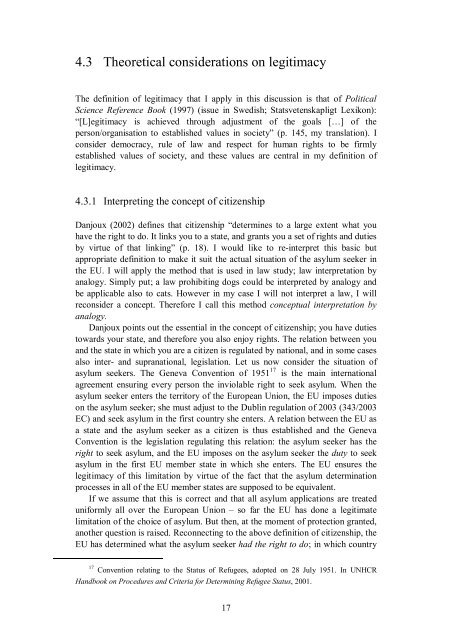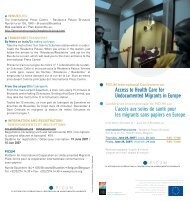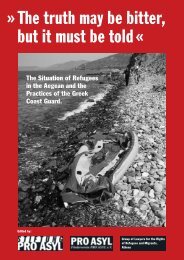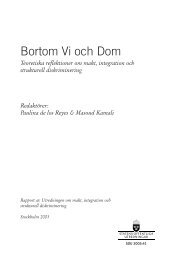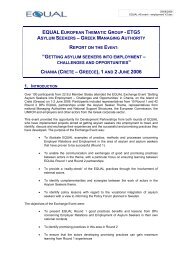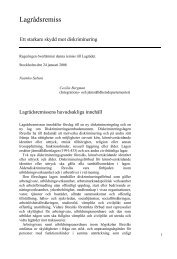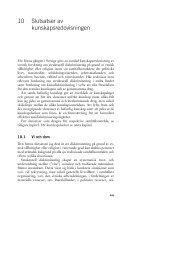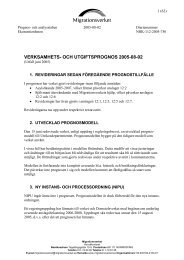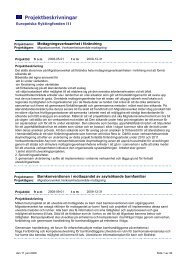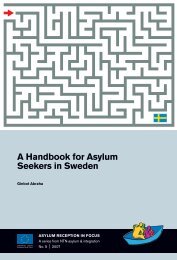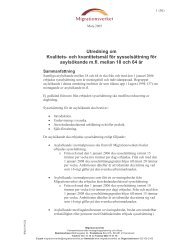The Common European Asylum System in Poland - Tema asyl ...
The Common European Asylum System in Poland - Tema asyl ...
The Common European Asylum System in Poland - Tema asyl ...
Create successful ePaper yourself
Turn your PDF publications into a flip-book with our unique Google optimized e-Paper software.
4.3 <strong>The</strong>oretical considerations on legitimacy<br />
<strong>The</strong> def<strong>in</strong>ition of legitimacy that I apply <strong>in</strong> this discussion is that of Political<br />
Science Reference Book (1997) (issue <strong>in</strong> Swedish; Statsvetenskapligt Lexikon):<br />
“[L]egitimacy is achieved through adjustment of the goals […] of the<br />
person/organisation to established values <strong>in</strong> society” (p. 145, my translation). I<br />
consider democracy, rule of law and respect for human rights to be firmly<br />
established values of society, and these values are central <strong>in</strong> my def<strong>in</strong>ition of<br />
legitimacy.<br />
4.3.1 Interpret<strong>in</strong>g the concept of citizenship<br />
Danjoux (2002) def<strong>in</strong>es that citizenship “determ<strong>in</strong>es to a large extent what you<br />
have the right to do. It l<strong>in</strong>ks you to a state, and grants you a set of rights and duties<br />
by virtue of that l<strong>in</strong>k<strong>in</strong>g” (p. 18). I would like to re-<strong>in</strong>terpret this basic but<br />
appropriate def<strong>in</strong>ition to make it suit the actual situation of the <strong>asyl</strong>um seeker <strong>in</strong><br />
the EU. I will apply the method that is used <strong>in</strong> law study; law <strong>in</strong>terpretation by<br />
analogy. Simply put; a law prohibit<strong>in</strong>g dogs could be <strong>in</strong>terpreted by analogy and<br />
be applicable also to cats. However <strong>in</strong> my case I will not <strong>in</strong>terpret a law, I will<br />
reconsider a concept. <strong>The</strong>refore I call this method conceptual <strong>in</strong>terpretation by<br />
analogy.<br />
Danjoux po<strong>in</strong>ts out the essential <strong>in</strong> the concept of citizenship; you have duties<br />
towards your state, and therefore you also enjoy rights. <strong>The</strong> relation between you<br />
and the state <strong>in</strong> which you are a citizen is regulated by national, and <strong>in</strong> some cases<br />
also <strong>in</strong>ter- and supranational, legislation. Let us now consider the situation of<br />
<strong>asyl</strong>um seekers. <strong>The</strong> Geneva Convention of 1951 17 is the ma<strong>in</strong> <strong>in</strong>ternational<br />
agreement ensur<strong>in</strong>g every person the <strong>in</strong>violable right to seek <strong>asyl</strong>um. When the<br />
<strong>asyl</strong>um seeker enters the territory of the <strong>European</strong> Union, the EU imposes duties<br />
on the <strong>asyl</strong>um seeker; she must adjust to the Dubl<strong>in</strong> regulation of 2003 (343/2003<br />
EC) and seek <strong>asyl</strong>um <strong>in</strong> the first country she enters. A relation between the EU as<br />
a state and the <strong>asyl</strong>um seeker as a citizen is thus established and the Geneva<br />
Convention is the legislation regulat<strong>in</strong>g this relation: the <strong>asyl</strong>um seeker has the<br />
right to seek <strong>asyl</strong>um, and the EU imposes on the <strong>asyl</strong>um seeker the duty to seek<br />
<strong>asyl</strong>um <strong>in</strong> the first EU member state <strong>in</strong> which she enters. <strong>The</strong> EU ensures the<br />
legitimacy of this limitation by virtue of the fact that the <strong>asyl</strong>um determ<strong>in</strong>ation<br />
processes <strong>in</strong> all of the EU member states are supposed to be equivalent.<br />
If we assume that this is correct and that all <strong>asyl</strong>um applications are treated<br />
uniformly all over the <strong>European</strong> Union – so far the EU has done a legitimate<br />
limitation of the choice of <strong>asyl</strong>um. But then, at the moment of protection granted,<br />
another question is raised. Reconnect<strong>in</strong>g to the above def<strong>in</strong>ition of citizenship, the<br />
EU has determ<strong>in</strong>ed what the <strong>asyl</strong>um seeker had the right to do; <strong>in</strong> which country<br />
17 Convention relat<strong>in</strong>g to the Status of Refugees, adopted on 28 July 1951. In UNHCR<br />
Handbook on Procedures and Criteria for Determ<strong>in</strong><strong>in</strong>g Refugee Status, 2001.<br />
17


